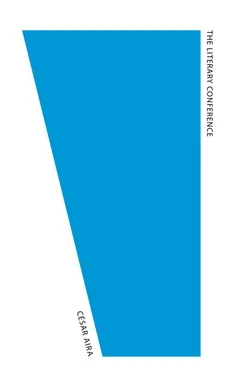Which reminds me of the answer to the question I left hanging: how to measure the velocity of my thoughts. I am trying a method of my own invention: I shoot a
perfectly empty thought through all the others, and because it has no content of its own, it reveals the furtive outlines — which are stable in the empty one — of the contents of the others. That retrograde cloned mini-man, the Speedometer, is my companion on solitary walks and the only one who knows all my secrets.
Just as I am total thought, I am total body. This is not a contradiction. All the totals get superimposed upon each other. . The concept of “totals” is fairly slippery; only a subject in motion can confront it, and the moment that subject is able to enunciate it, it becomes a truth. It was the truth within the restricted Universe of those days of rest I allowed myself under the tropical sun in the swimming pool of a luxury hotel on the outskirts of the city while my operation was underway. I regretted it would last for only the few days of a single week; the pleasure of such delicious passivity could only make me wish that life in its totalness was like that, the total world, the total of totals. It was natural for me to slip into totals. My body accepted it, swelled up with it, radiated it. To top it off, the weather was perfect. Few people went to the pool: several youngsters, male and female, some children with their mothers, one or another loner like me. . Some mornings nobody was there. The caretaker swam melancholically, lap after lap, dozed in his chair, and amused himself trying to catch drowned mosquitoes floating just under the surface of the water using a net with a very fine mesh. The water was as clear as well-washed crystal: you could have read a newspaper floating on the bottom. My hosts at the conference told me it was logical so few people went. . In fact, they couldn’t believe it when I told them I was not the only one there. Who would ever think, they exclaimed, of going swimming in the middle of winter? It’s true, it was winter, but being so close to the equator, it made no difference to me; as far as I was concerned it was still summer, and it continued to be a totality of summer, and life.
One curious thing I noticed and wish to make note of in this report is that all of us who went to the pool those few days, without knowing each other or having planned anything at all among us, were perfect specimens of the human race. What I mean is, we all looked human, with all our members and corresponding muscles and nerves in their proper places and proportions. Physical perfection in the human is rare by definition, for the slightest defect nullifies it. If you look at people in the street, scarcely one in a hundred passes the test. All the rest are monsters. But, to my languid surprise, those of us who came to the pool (different ones every day, except me) constituted a gathering of that one percent. I wonder if it isn’t always like that, in every unplanned encounter. Be that as it may, what with the swimmers wearing only bathing suits, their bodies exposed to the sun, there was no room for denial. The spectacle soothed my eyes and my mind. I didn’t look for defects, because there were none; in a certain sense, there couldn’t be any. Deviations from the physical canon produce monsters; all kinds of monsters, even imperceptible ones. One toe slightly wider or longer than it should be is enough to create some sort of monster. One cell, a spelling mistake within a cell. . For some reason, monsters manage to escape from the net that brings humans to the surface. They remain floating like Cartesian devils in the half-light of unreality. I know a lot about such things because this is the branch of science I practice.
Perfections, on the contrary, are all different: perfection in itself is the perfection or full expression of difference. This is why cultivating perfection means collaborating with what a young disciple once defined as the task we should dedicate our lives to: giving birth to the individual.
My daydreams left me paralyzed. For hours I would lie cataleptic in my lounge chair. The art of perfecting the body could only be practiced during an eternal summer, or an eternal day, or an endless life. . But, like the seasons in the tropics, like this anachronistic autumnal summer, such eternities must be silhouetted against an alien psyche, and be invisible to all.
Wasn’t this method more practical than cloning? Was there anything stopping me from adopting it? Now that I was rich, thanks to the Macuto Line (it had happened so recently I still wasn’t used to the idea), I could settle in under that sky and live naked under the sun without worrying about anything. I wouldn’t even have to change my field. Literature, cloning. . transformations. . I have become convinced of what I consider to be the basic premise of everything I will ever do in my life: all transformations occur without the least expenditure of energy. This is fundamental. If effort were required, even the most minimal amount — and given that in a transformation the point of departure and arrival are identical, i.e. the “transformed”— energy
would be left over and would, in turn, inflate one end or the other of the universe, creating a bulge and returning us to the realm of the monstrous.
But no. I was roused from these fantasies when I remembered the work at hand. I dove into the water one last time, swam for a while in the now-deserted pool, then walked around the edge, letting the setting sun and the gentle breeze from the highlands dry me off. All around me I could see the mountains and their snow-covered peaks. Up there, in some inaccessible spot, the cloning machine, the hidden heart of the heights, was carrying out its secret task.
My shadow stretched out in front of me, a human shadow, but also alien, irreconcilable. I stretched out my arms, and the arms of the shadow did the same; I lifted a leg, bent at the waist, turned my head, and the shadow imitated me. Would it do the same if I stretched out the fingers on one of my hands? I tried it. I abandoned myself to a dance of recognition. . The other bathers watched me out of the corners of their eyes, discreetly. . When you are traveling the thought that nobody knows you gives you a certain feeling of impunity. That wasn’t the case with me. The breeze carried snippets of their conversations, and I realized they were talking about me: “famous writer. . Macuto Line. . he was in the newspapers. .”
Impunity: it’s always impunity that gets you dancing. What did I care about being ridiculous? I was on my way to earning a superior kind of impunity, and nobody knew it.
The only interruption to this rash of days of repose and swimming was on Wednesday night, when I felt obliged to perform a very private ceremony. That afternoon, the wasp had died.
Two days earlier, I returned her to the cage I had carried her in from Buenos Aires after she had brought me a cell from Carlos Fuentes. When I decided to bring her, I knew that for her it would be a one-way trip. Those insects have very short lives, and by the time she was five days old, hers, in fact, had already been a long one. Once she had completed her mission, I didn’t need her anymore and could have destroyed her, as well as her little cage, and thereby left no trace of my activities. Traveling with her brought with it a touch of risk, so I kept her hidden. Despite there being no law regarding the international transport of cloned materials, the custom agents’ sensitivities to the transport of drugs, genetic mutations, and bacterial weapons could have created problems. I had no choice but to bring her, so I took the chance. Luckily nothing happened.
Nor did I want anybody at the hotel to know of her existence: my scientific activities are secret; giving explanations would have put me on the spot, especially if it became known that I was experimenting with a renowned Mexican author. All things considered, disposing of the wasp the moment I no longer needed her would have been the most prudent thing to do; and I needn’t have felt any scruples for she would anyway have soon died a natural death. But my loyalty to my little creature won the day. I preferred to wait for her to perish on her own, complete her own life cycle, as if Nature were mediating between her and me according to Her own sacrosanct laws.
Читать дальше












